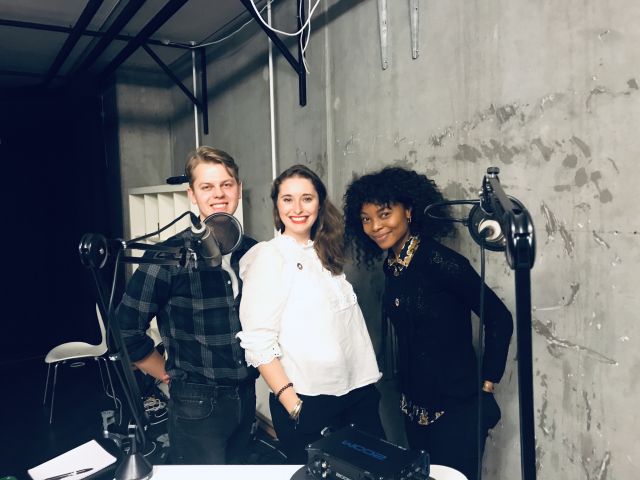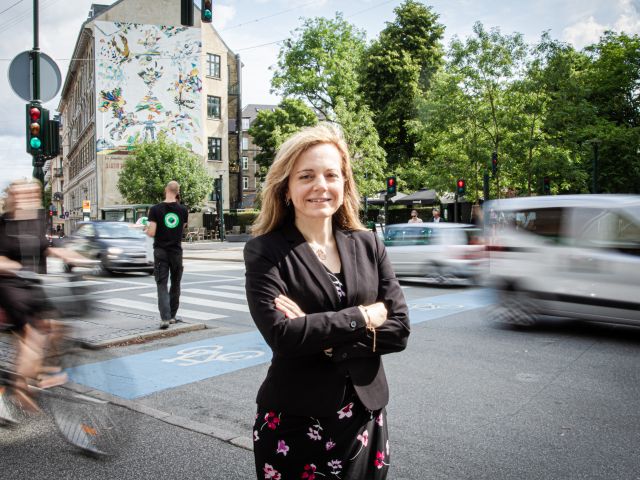CBS startup helps students get the experience they lack

(Photo by Mette Koors)
When studying at CBS, Louise Bech Junge and her friend Mikkel Korn Frederiksen saw how their fellow students were struggling to get relevant student jobs. So, the two friends leapt into action and established Taskflex. And after graduating this summer, they’re putting all their energy into expanding into Norway and Sweden, and to make it “scale up like crazy”.
Co-founder of Taskflex, Louise Bech Junge and her partners are very busy at the moment. They’re developing, expanding and scaling up their business by working on their online platform, focusing on marketing, recruiting more students and forming new partnerships.
“Right now we’re in dialogue with different incubators such as Copenhagen Business Hub and Danish Startup Group who have shown an interest in us. We’re also hiring new students every second week, and to me, this shows that we’ve managed to create a solution to a very apparent problem,” she says and continues:
“We’ve also begun putting more energy into marketing and developing the competences that we offer on our platform, so that we’ll be the go-to place for companies and students.”
Taskflex also plans to expand geographically. Their platform will soon be translated into Swedish, Norwegian and English, and since they have clients in Norway and Sweden, Louise Bech Junge hopes to expand Taskflex to these countries in the near future.
Getting a foot in the door
Taskflex is a platform that enables students to get more experience within their field of education, and to ultimately put them in a better position for future job opportunities. The company was established 2.5 years ago when Louise Bech Junge and her partner noticed that many of their fellow students at CBS had difficulties getting student relevant jobs due to a lack of experience.
“Many of our fellow students were struggling to get a student job. Some of them had even been applying for a whole year before getting a job. They just didn’t stand a chance because they had nothing relevant on their CVs,” Louise Bech Junge says.
“It was difficult for them because they had to compete with other students who had the right network and therefore had gotten a relevant job where they could learn and get the competences and experience needed to access their dream job after graduating.”
At the time of establishing their company, Louise Bech Junge and Mikkel Korn Frederiksen were both studying HA Almen, and back then, Mikkel in particular experienced difficulties in getting a relevant student job.
“Mikkel had difficulties getting his foot in the door to a relevant job. He’d worked as a warehouse operative, but that’s not very relevant if you want to get a job as a CBS student in one of the larger business companies,” Louise Bech Junge says.
Supporting the students
The way Taskflex works is that students create a profile, and companies can contact them directly via the platform when they have an assignment that needs to be solved.
The students get paid for the assignments they get hired to do, and although Taskflex leaves most of the communication up to the students and the companies themselves, they provide guidance on whatever questions the students might have.
“We communicate with the students a lot, and we always ask them if they need help with pricing before taking an assignment, or about how much companies can expect from them when they’re solving a task,” Louise Bech Junge says.
“There are a lot of aspects and discussions between the student and the company, which can be pretty difficult for some students to deal with – especially if you’re young and inexperienced. It can be quite difficult and intimidating to have a 50-year-old employer on the phone who’s unhappy with your work. So these are some of the areas where we take part in the dialogue and support the students.”
From a rough diamond to a mastermind
The companies that use Taskflex are often small-scale companies who have specific assignments that are applicable to the educational profiles of the students, such as company logos that can be created by graphic design students or market analysis done by CBS students.
By using Taskflex, small companies don’t have to hire educated and somewhat expensive candidates for the job, and can therefore save money.
This might seem a bit anti-competitive since those, who actually have the experience and competences that students lack, are left out of the equation. But, according to Louise Bech Junge, this is not the case.
“A lot of experience also costs a lot of money. Therefore, we divide our students into three different categories according to how many assignments they solve, and the feedback that we get from our clients,” she explains and continues.
“Students start off as a ‘rough diamond’, then they rise to be a ‘rising star’, and lastly they end up as a ‘mastermind’ on our platform. This means that the more skilled the students get, the more the hourly rate will increase.”
“Therefore, the companies choose the level of students they want to cooperate with, which reflects ‘the real world’ in business, and this is why I don’t think we create problems for graduates and experienced candidates,” Louise Bech Junge says.







































































































































Comments